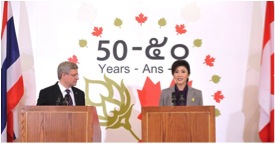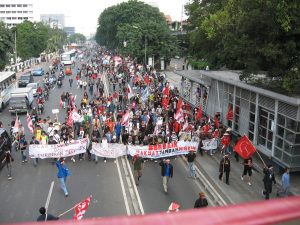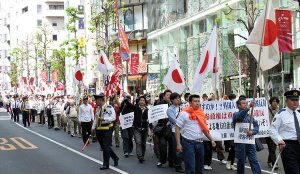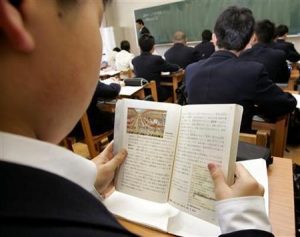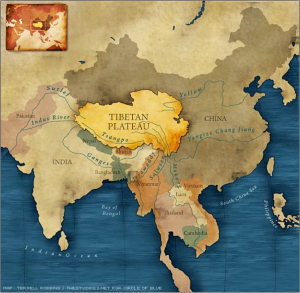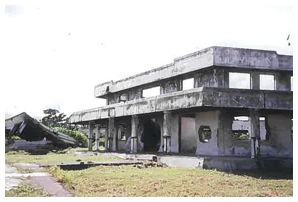Hindu Nationalism is the Biggest Security Threat to India
Memo #160 – India portrays Islamic radicalism, ethnic separatism, and the left-wing Naxalite guerrilla movement as security threats. But it is Hindu nationalism (Hindutva) that generates most hatred and violent conflicts amongst Indian citizens; it is not able to support India as a multi-religious and multi-ethnic state.
Asia in the Governance of Outer Space
Memo #154 – In 2011, the United States Secretary of Defense and the Director of National Intelligence called global attention to the congested, contested, and competitive nature of outer space activities. All space powers, including in Asia, continue to struggle with the safety and security of assets that undergird their modern economies, militaries, and societies. The practical issue is how to achieve national objectives, some of which are only possible in collaboration with others.
Taiwan’s Liberal Values may Corrode China’s Authoritarian System
Memo #153 – Hong Kong was returned to the People’s Republic of China (PRC) on July 1, 1997. The island maintained rule of law and civil liberties. Socially, economically, and politically, there has been some degree of convergence under the “one country, two systems” system. Hong Kong has become more open to mainland tourists and students, and in the process taught them the importance of liberal values, such as freedom of speech, protest, and assembly. On the other hand, mainland China has converged with Hong Kong as its economy and society have become far more open than ever before.
Exporting “Tough on Crime” Policy to Thailand: Harper’s Recent Visit
Memo #148 – Human smuggling and terrorism – not trade – played centre stage in Prime Minister Stephen Harper’s visit to Thailand in March. Although the Thai government was eager to solicit more interest in trade during a visit that marked the 50th anniversary of Canada-Thailand relations, it was left with $7 million (CDN) for an anti-crime program and an “exploratory” talk on free trade.
Explosive Fuel Politics in Indonesia
Memo #146 – Indonesian cities have recently witnessed a wave of protests as citizens voiced complaints against a planned fuel price hike. On March 30, 2012, students in Jakarta stormed the legislature and clashed with police. Legislators have carefully adjusted their positions to distance themselves from the hated fuel price hike.
Japan’s Failure to Enfranchise its Permanent Resident Foreigners
Memo #145 – Over 500,000 Koreans, many who were born and raised in Japan, have become disheartened since Japan’s historic change of government in 2009. In March 2010, the Japanese government failed to submit the long-awaited bill to give voting rights to permanent resident foreigners. Enfranchisement is a major political issue in Japan and the political rights of permanent resident foreigners are ignored.
Japanese History Textbook Controversies: The Missing Link
Memo #144 – History textbook controversies in Japan (教科書問題) focus on “facts” about particular events and question specific phrasing and numbers. In the past, Chinese and South Korean governments have charged that Japanese government-screened history textbooks allegedly trivialized and/or justified past atrocities.
Water, Scarcity, and Tibetan Plateau Frontiers
Memo #142 Theme Editors: Tashi Tsering and Jack Hayes Freshwater (in)security is quickly rising as a critical global challenge. Today, March 22, is World Water Day. The focus is freshwater and measures for conservation and management. Last fall, Asia Pacific Memo published four Memos as part of its Theme, “Water, Scarcity, and Tibetan Plateau Frontiers.” […]
Indonesia’s Draft Law Exacerbates Religious and Ethnic Tensions
Memo #141 – Conflicts between religious and ethnic communities in Indonesia last year raised fears that communal violence might again erupt across the archipelago, as it did from 1999 to 2001. Disputes between Muslims and Christians led to the burning of several churches, the bombing of a church in Central Java, and the displacement of 7,000 people in Maluku.
Social Networks and Japan’s 3/11 Disaster
Memo #137 – Social networks matter. They help us find jobs. They influence whether or not we vote and if we gain weight or get buff. Long before last year’s nuclear disaster in Japan, electric power utilities worked with the central government to place atomic power plants in villages along the coast with weaker social networks.


